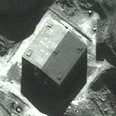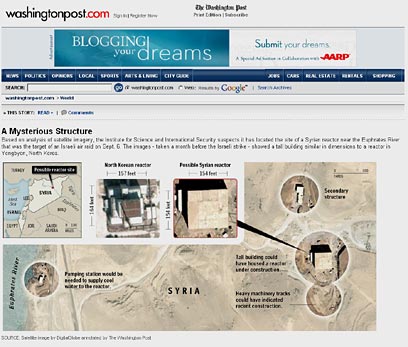
Book: Barak opposed strike on Syrian reactor
According to 'Inside Israel’s Secret Wars,' Olmert, Ashkenazi and Dagan claimed political considerations were behind defense minister's opposition to strike on nuclear site in Dir a-Zur
Defense Minister Ehud Barak is pushing for an Israeli strike on Iran's nuclear facilities, but five years ago he was staunchly opposed to the successful attack on Syria's reactor, a new book reveals.
Related articles:
- The long road to Syria
- Bush: Olmert asked me to bomb Syrian reactor
- US memo: Israel bombed Syrian reactor
According to foreign reports, the Israeli Air Force bombed the reactor in Syria's Dir a-Zur region on September 6, 2007 under a veil of secrecy. Only some six months later US government officials announced that the destroyed target was a nuclear plant that was built with North Korea's assistance.
Israel has never admitted to the bombing.

Washington Post report on reactor
In their book "Spies Against Armageddon: Inside Israel’s Secret Wars," Dan Raviv and Yossi Melman claim that Barak asked to postpone the strike despite intelligence reports indicating that the reactor would become operational within months.
Following a behind-the-scenes "war" with then-Prime Minister Ehud Olmert, Defense Minister Barak voted in favor of an attack after realizing that it would be green-lighted by the government.
"If in 1991 it was Opposition Chairman Shimon Peres who was against the strike (on Iraq's nuclear reactor), this time the opposition came from within the government, and it astonished the cabinet ministers and the security establishment," the book states.
"Barak did not say that he was against an attack in Syria in principle, but argued that Israel can wait a few months. The problem was that everyone else knew this wasn't the case, because radioactive materials would have been placed in the reactor within months, and Israel couldn't risk an attack that would pollute the environment. Olmert demanded that the cabinet vote on the issue. Barak capitulated and joined the supporters."
The book also describes the ensuing rift between Olmert and Barak, as well as the friction between Barak, then-IDF Chief of Staff Gabi Ashkenazi and Meir Dagan, who served as the head of Mossad. "These disagreements were to become scars that did not heal. The animosity between these people escalated, and a few years later it would shape the debate surrounding the Iranian nuclear (program)," Melman and Raviv assert.
"Barak is in favor of (striking Iran), while the three others (Olmert, Ashkenazi and Dagan), despite not holding any official titles, have lost their confidence in the defense minister's calculations."
According to the authors, Olmert and the other senior officials reached the conclusion that Barak's opposition to a strike in Syria was driven by political and personal considerations related to the Winograd Commission, which was due to publish its findings on the failures of the Second Lebanon War.
"Ashkenazi, Dagan and particularly Olmert concluded that the defense minister was hoping that the prime minister would have to (resign) and that he – Barak – would be appointed (prime minister) in his place or serve as defense minister in an alternative government headed by Benjamin Netanyahu, in which he would be more influential," the book says.
"In such a case a successful attack in Syria would be credited to him. Barak was aware of his rivals' claims and dismissed them out of hand. He said that during the cabinet's deliberations he warned that (Olmert's) moves were reckless."
- Follow Ynetnews on Facebook and Twitter
- Receive Ynetnews updates directly to your desktop










